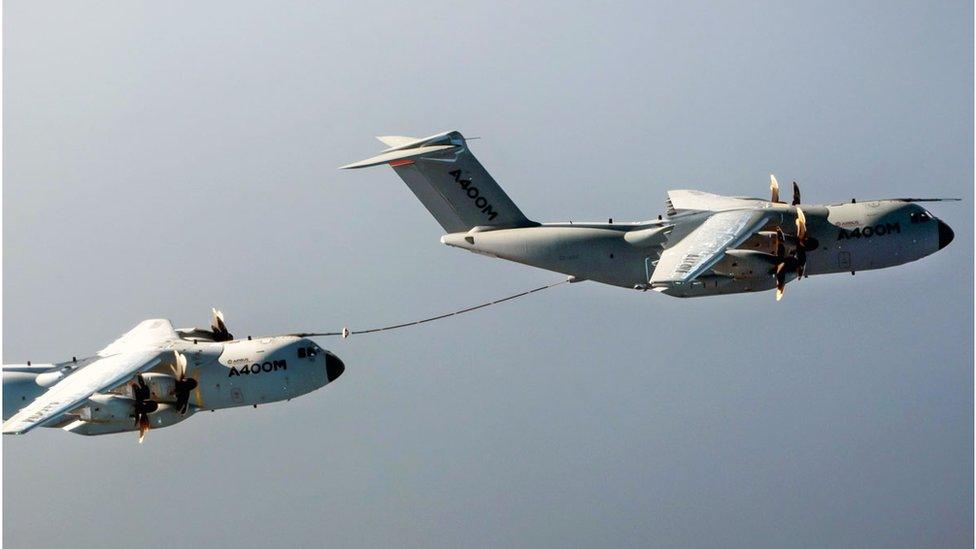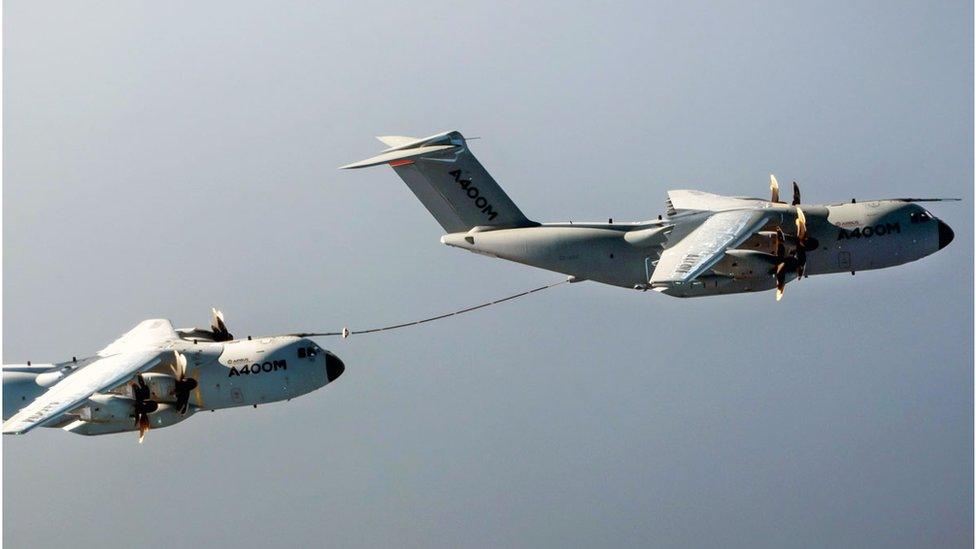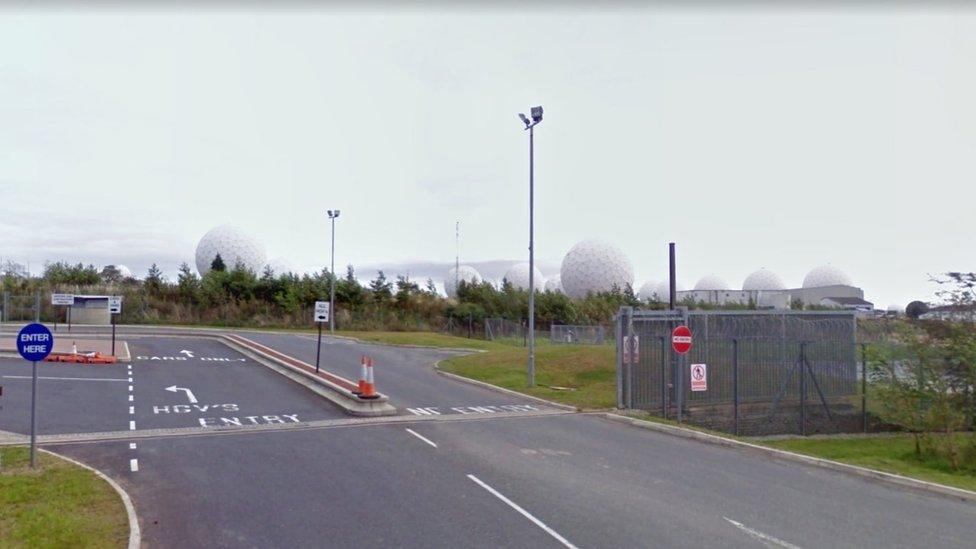Cobham takeover: Boris Johnson defends £4bn sale to US equity firm
- Published

Boris Johnson has defended the controversial £4bn takeover of UK defence and aerospace company Cobham by a US private equity firm.
The government approved the sale of Cobham to Advent International on Friday, after the deal was delayed because of national security concerns.
Former First Sea Lord Admiral Lord West said Cobham holds defence technologies which are "critically important".
But the PM said "a lot of checks" had been gone through to satisfy concerns.
Speaking on a trip to see British troops in Estonia, Mr Johnson said: "I think it's very important that we should have an open and dynamic market economy.
"A lot of checks have been gone through to make sure that in that particular case all the security issues that might be raised can be satisfied and the UK will continue to be a very, very creative and dynamic contributor to that section of industry and all others."
'Deeply concerning'
Advent International made its initial offer in July and it was approved by shareholders in August.
The government ordered a review from the competition regulator, the Competition and Markets Authority (CMA), a week after Admiral Lord West expressed concerns, in an interview with the Daily Mail,, external
The CMA's report, published at the end of October, external, said the MoD had outlined two main areas of security concern over the sale:
The risk of "unauthorised persons" obtaining information about the MoD's capabilities and activity
The threat to existing MoD programmes (due to funding cuts or moving capabilities "off-shore")
In a statement on Friday, external, Business Secretary Andrea Leadsom said she was satisfied the risks that had been identified had been mitigated "to an acceptable level" - and allowed the deal to go ahead.
But Admiral Lord West said that while he was "delighted" that was the case, "it does mean that there are national security risks that are being mitigated".
He stressed the importance of maintaining defence capabilities in what he called a "chaotic and rapidly changing world where old alliances are no longer certain", adding "no other advanced industrial nation and certainly no permanent member of the UN Security Council is so cavalier about giving up such capabilities".
Sir Ed Davey, acting leader of the Lib Dems, described the move as "deeply concerning".
He added that "we have yet to see evidence" that the previous concerns over national security had been mitigated.
The decision to approve the takeover was described as "deeply disappointing' by Lady Nadine Cobham - part of the family which set up the UK firm.
She criticised the timing of the announcement, saying it was "cynically timed to avoid scrutiny on the weekend before Christmas", adding: "In one of its first major economic decisions, the government is not taking back control so much as handing it away."
'Long-term assurances'
Shonnel Malani, partner at Advent, said the firm took the takeover "seriously".
"We are confident the transaction and undertakings being given on national security, jobs and future investment, provide important long-term assurances for both Cobham's employees and customers, particularly in the UK and also globally," Mr Malani added.

Cobham, which employs 10,000 people, has extensive contracts with the British military and is seen as a world leader in air-to-air refuelling technology.
The firm, based in Wimborne, Dorset, also makes electronic warfare systems and communications for military vehicles.
Its expertise played a significant role in the Falklands War, allowing the Royal Air Force to attack the remote Port Stanley airfield.
'Meticulous' decision
Mrs Leadsom said the decision had been "meticulously thought over" and that she had taken advice from the defence secretary and the deputy national security adviser.
She added that sensitive government information would continue to be protected under the new owner and existing contracts would be honoured.
The company is also obliged to give the government prior notice of any plans to sell the whole, or elements of, Cobham's business.


Just before 10pm on a Friday is an odd time for this kind of thing to be announced.
One defence analyst remarked that it was as if the government rather wanted no-one to notice what had happened.
The curious timing may actually draw more attention than if it had been done at a more normal hour - few doubted the government would block the deal, and shareholders in Cobham have already voted overwhelmingly in favour.
It says something of the sensitive nature of Cobham's business that much of the published version of the competition regulator's report on the takeover was simply blacked out.
In one unedited passage of the report, the Ministry of Defence said if the deal went ahead there was "a risk that the institutional framework and safeguards required by the government's security framework may be undermined".

Cobham's history

Aviation pioneer Sir Alan Cobham became a household name in the 1930s
Cobham plc is a group of defence and technology businesses which started out as a family firm founded by Sir Alan Cobham.
Sir Alan became a flying instructor in 1918 after volunteering to join the Royal Air Force during World War One.
He received a knighthood from King George V in 1926 for his pioneering work in aviation.
Sir Alan became a household name after devising Cobham's Flying Circus in the early 1930s. The aeronautical acrobatics show toured England and South Africa.
He then went on to focus on air-to-air refuelling and formed Flight Refuelling Limited in 1934, which developed into Cobham plc as it is known today.
Aside from aviation, Cobham's innovations include lightweight tanks, radar technology for maritime defence and spacecraft technology.
- Published21 December 2019

- Published18 September 2019

- Published12 September 2019

- Published29 August 2019
